You’re watching your favorite show in the living room when you hear a loud fart. Or you suddenly smell something horrible, and you’re the only person in the room. You turn to see where it came from and—oh no! Your dog just passed gas.
You might feel embarrassed or angry initially, but don’t worry—you’re not alone. Dogs pass gas for many reasons and can also have trouble controlling their farts. It’s all part of being a dog owner.
We know you’ve probably seen your dog fart before, but maybe you don’t understand why it does it or what to do when it does. Can it be controlled?
Today, we answer all your questions about what causes dogs to fart and how you can help manage those farts so that everyone in the house is happy and healthy (and don’t have to worry about embarrassing smells).
Causes of Dog Farts
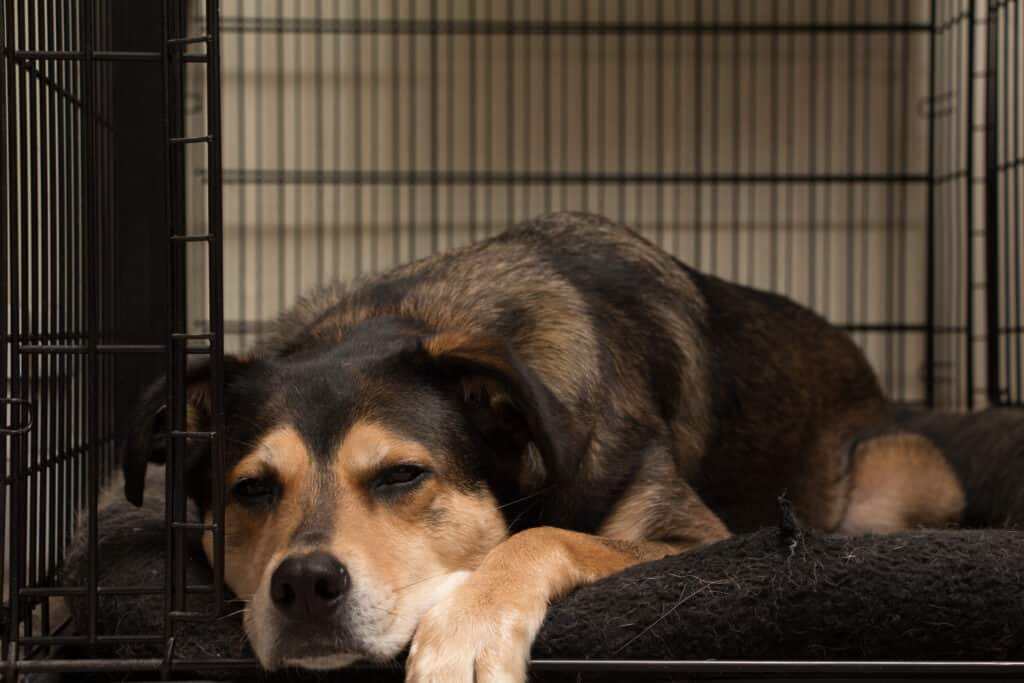
There are many things that can cause a dog to start farting more often than usual.
©Stephanie Barnes/Shutterstock.com
Farting is a normal part of life for dogs and is widespread in puppies. But if your dog suddenly starts farting more than usual, it could signify serious health issues.
There are many things that can cause a dog to start farting more often than usual. Some of them are relatively minor, while others are serious and potentially life-threatening conditions.
Here are some of the most common causes of frequent farts in dogs:
Certain Foods
Every dog has its unique digestive system, so some foods that are fine for a dog may cause another to fart. Some of the most common culprits include:
Milk and Dairy
Most dogs are lactose intolerant and can’t digest it. So when they consume food with lots of lactose, they are unable to absorb the sugars. The sugar then moves to the colon (large intestine), where bacteria break it down, causing gas.
Beans and Legumes
Beans and legumes like soybeans contain fiber molecules. Because dogs lack digestive enzymes to break them down effectively, they enter the large intestine, where bacteria ferment them, resulting in gas production.
Red Meat
Red meat contains more sulfur than other meats. Sulfur produces odorous gases when broken down by bacteria in your pet’s digestive tract. This reaction can result in excessive flatulence that may last up to 24 hours after eating red meat products such as beef or lamb.
Table Scraps
Dogs love to eat table scraps and often beg for them when they see you eating them. Although feeding your dog table scraps is not recommended, we know some people still do. If you give your dog too many table scraps, it can result in excess flatulence. In addition, it causes gas because table scraps often contain high amounts of fat and carbohydrates, both known to cause flatulence in dogs.
Medical Conditions
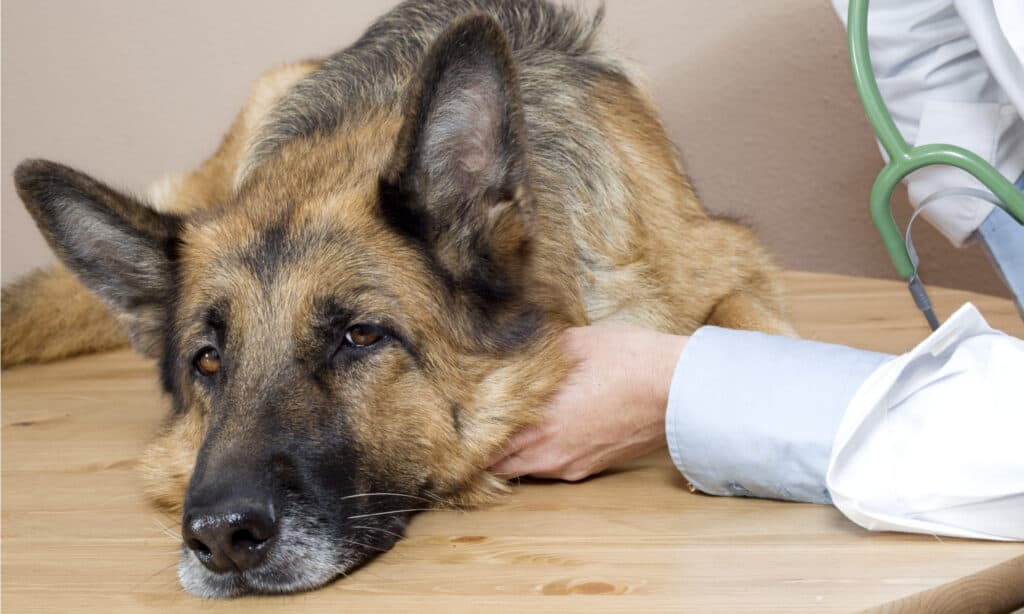
Certain medical conditions cause gas in dogs.
©Roger costa morera/Shutterstock.com
Certain medical conditions cause gas in dogs. These conditions may include inflammatory bowel disease, intestinal parasites, exocrine pancreatic insufficiency, inflammatory bowel disease, and pancreatitis.
Inflammatory bowel disease is a chronic condition that causes colon and small intestine inflammation. This medical condition inflames the gastrointestinal tract, disrupting nutrient digestion and resulting in vomiting and diarrhea.
Dogs with exocrine pancreatic insufficiency can’t produce pancreatic enzymes for digesting proteins and carbohydrates. Because of this, more undigested food will reach the large intestine, where bacteria will break down and cause gas.
Intestinal parasites are one of the dogs’ most common causes of foul-smelling farts. Parasites like giardia and coccidia irritate your dog’s intestinal tract lining and cause gastrointestinal upset. The gas created by this irritation is often released through flatulence, resulting in unpleasant odors.
Eating Too Fast
Eating too fast is a common cause of dog farts. Dogs tend to gulp their food quickly because they are eager to get back to playing and exploring. Unfortunately, this behavior of eating too fast can cause them to swallow air as they chew. As this air enters the digestive tract, it expands and causes flatulence.
If your dog has recently eaten, you will probably notice that it passes gas after about 20 minutes. This happens because its body has not yet had time to digest the food. However, seeing or smelling it passing gas more than an hour after eating could signify a digestive disorder or other problems such as colitis or irritable bowel syndrome (IBS).
Food Changes
Food changes can cause flatulence in dogs, especially if they have sensitive stomachs. If you introduce new foods into your dog’s diet, it could make it gassy. It may also get gas from drinking too much water too soon after eating. In addition, dogs often experience bloating when they overeat grain-based food.
Grains like wheat and corn contain starches that dogs can’t easily. This can cause gas, diarrhea, or constipation in some dogs. Luckily, there are many grain-free dog foods out there that can help your pet.
Helping and Treating Dogs with Farts
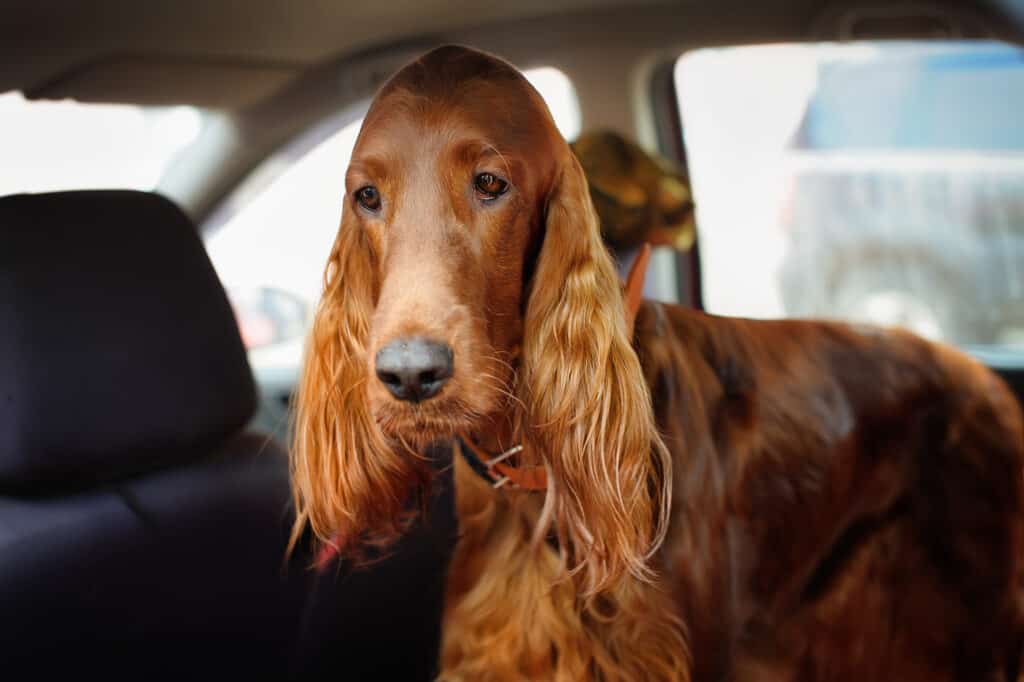
Farting is a sign of gastrointestinal distress in some dogs.
©Kseniia Kolesnikova/Shutterstock.com
For some dogs, farting is a sign of gastrointestinal distress. However, if your dog is frequently farting, and you can smell the gas, it could signify something more serious.
If your dog’s farts are accompanied by diarrhea, vomiting, or eating less than usual, take it to the vet for an examination. It may have an intestinal blockage or some other medical condition.
If no other symptoms accompany your dog’s farts, there are several things you can do at home to help it feel better.
Feed Your Dog a High-quality Diet
High-temperature cooked dog food can cause gas in your pet. That’s because cooking changes the molecular structure of proteins in the food, making them more difficult for dogs to digest. If you feed your dog cooked food, consider switching to a raw diet containing proteins that are easier for your dog to digest.
Consider adding probiotics and digestive enzymes to its diet. Probiotics are live microorganisms that help maintain a healthy balance of microflora (good bacteria) in your pet’s digestive tract. They also aid in digestion and nutrient absorption.
Digestive enzymes break down protein into amino acids, making it easier for dogs with sensitive stomachs to digest their food without causing an upset stomach or gas pains.
Add charcoal tablets to their food once or twice a week (or more often if your pet has chronic issues with flatulence). Charcoal tablets can help reduce gas by binding with hydrogen sulfide and sulfur compounds as they pass through the intestinal tract.
Change Your Dog’s Diet Gradually
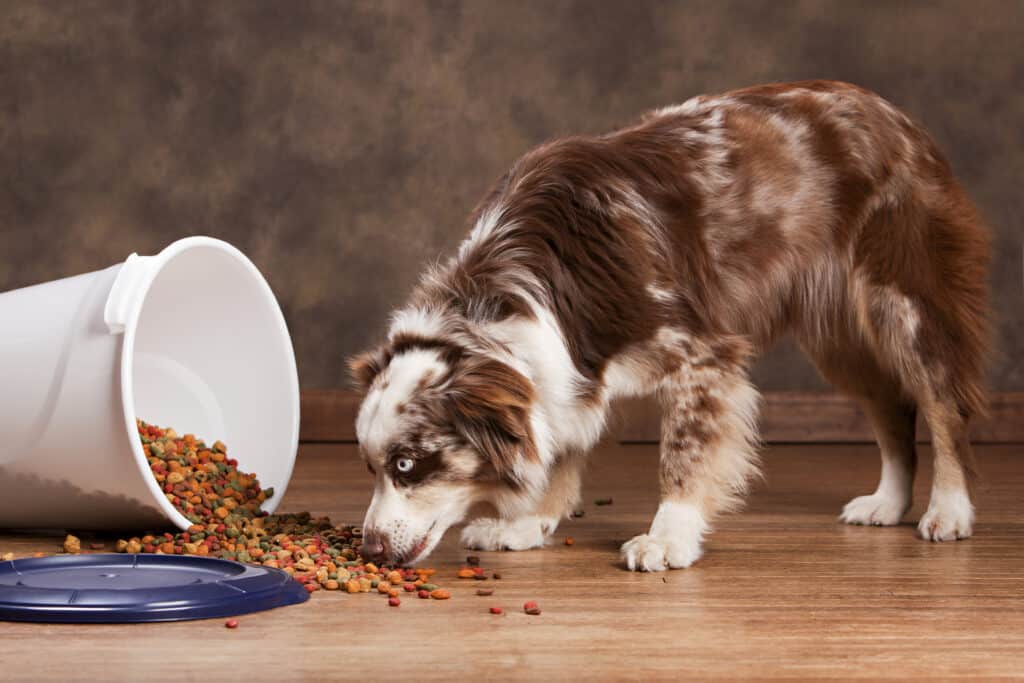
Feeding your dog low-fiber and highly digestible foods will help to settle its gut and make it feel better.
©Michelle D. Milliman/Shutterstock.com
Feed your dog low-fiber and highly digestible foods. This will help to settle its gut and make it feel better. If your dog is on a dry kibble diet, try mixing in some canned food, then gradually increase the amount of canned food until it’s all it’s getting (except for treats).
If your pet is on a high-protein diet, try switching to one with less protein. High protein diets can cause diarrhea in dogs that are sensitive to them.
For example, if your dog is on a kibble diet, try switching to one with less than 30% protein. Then gradually increase the amount of canned food until it’s all it’s getting (except for treats).
Another option would be to switch from kibble to raw meaty bones (RMBs). RMBs are a natural source of minerals and other nutrients that may help calm your dog’s gut down and stop diarrhea.
Manage Your Dog’s Weight
Overweight dogs are more likely to have problems with flatulence than those who maintain a healthy weight. Obesity in dogs can cause digestive issues and make it difficult for them to digest their food correctly. Fortunately, many dog foods for weight loss can help if your dog is overweight.
Weight loss tips for dogs include:
Feed Your Pet Less Food
Look for foods with fewer calories per cup if you feed them commercial pet food. When providing a homemade diet, reduce the amount of food by 10% each week until your dog reaches its ideal weight.
Switch to a Lower-calorie Food or Treat
Although table scraps are generally not recommended, some people still use them as treats. If you’re using treats, choose ones that are lower in calories per treat or piece. For example, you can switch from dry kibble to canned food, which has fewer calories per cup than dry food or rawhide chews.
Exercise More Often and More Vigorously With Your Pet
A brisk walk at least once a day is suitable for both of you, but if possible, try to increase the intensity of the exercise so you both burn even more calories. This will benefit your health, help you spend more time with your pet, and increase bonding.
Give It a Massage
Massaging your dog’s tummy can help with farts, especially when it has gas. You may have to rub it for a few minutes for this to work. When massaging the dog’s tummy, you want to start at the rib cage and work your way down toward the tail.
Ensure you massage in circles and don’t press too hard on the stomach. It is best to rub in small circles around its stomach because this helps break up any gas bubbles that are building up inside it.
Teach Your Dog To Eat Slower
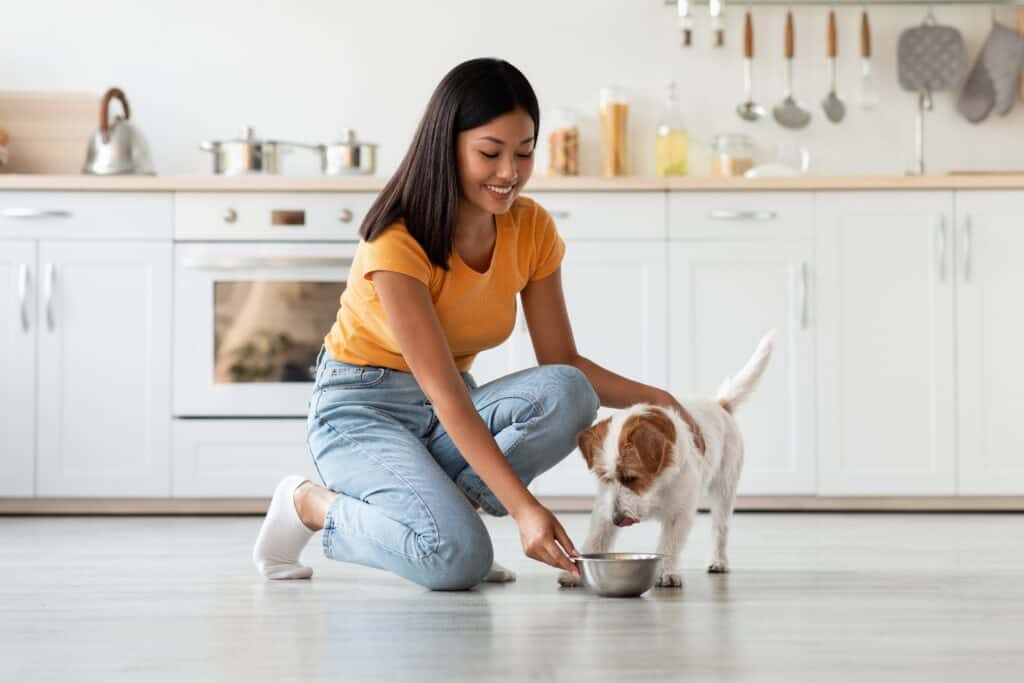
The slower your dog eats, the less air it has in its stomach, and the less likely it is to pass gas.
©Prostock-studio/Shutterstock.com
The slower your dog eats, the less air it has in its stomach, and the less likely it is to pass gas. If your dog doesn’t have a history of flatulence but is suddenly gassy, it could be that it is eating too fast.
The best way to teach your dog to chew more slowly is by adding more treats to its meals until it’s taking at least 15 minutes per meal. That’s how long you should wait before giving it another piece of kibble (or whatever its favorite treat is).
Once it has learned this lesson, you can reduce the number of treats per meal until you’re down to just one or two pieces per meal — and then increase again if it starts to get fussy about being hungry.
Final Thoughts
So, what do you know about dog farts?
You now have a good idea of the causes and treatments of dog flatulence. In most cases, however, there is no need to worry or feel uncomfortable with your dog’s gas. Although it can be annoying and stinky, the health risks are generally low. However, if your dog is gassy all the time, or seems to be having trouble passing gas, take it to the vet for some tests. Don’t wait too long, as waiting can make treatment more complex and less effective.
Up Next:
- Can Dogs Drink Orange Juice Safely?
- Can Dogs Get Alzheimer’s?
- Can Dogs Get COVID-19? Symptoms, Risks, and Prevention
The photo featured at the top of this post is © fongleon356/Shutterstock.com
Ready to discover the top 10 cutest dog breeds in the entire world?
How about the fastest dogs, the largest dogs and those that are -- quite frankly -- just the kindest dogs on the planet? Each day, AZ Animals sends out lists just like this to our thousands of email subscribers. And the best part? It's FREE. Join today by entering your email below.
Sources
- Pledge Care, Available here: https://pledgecare.org/the-consequences-of-high-temperatures-in-pet-food/
- Pets And Parasites, Available here: https://www.petsandparasites.org/dog-owners/giardia-in-dogs
- AKC, Available here: https://www.akc.org/expert-advice/health/how-to-stop-dog-farts/
Thank you for reading! Have some feedback for us? Contact the AZ Animals editorial team.






